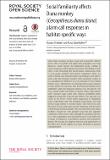Files in this item
Social familiarity affects Diana monkey (Cercopithecus diana diana) alarm call responses in habitat-specific ways
Item metadata
| dc.contributor.author | Stephan, Claudia | |
| dc.contributor.author | Zuberbuhler, Klaus | |
| dc.date.accessioned | 2016-02-26T09:40:04Z | |
| dc.date.available | 2016-02-26T09:40:04Z | |
| dc.date.issued | 2016-02-24 | |
| dc.identifier | 241102937 | |
| dc.identifier | a2ae3e1b-60eb-4519-b918-89d9467273dd | |
| dc.identifier | 84959419632 | |
| dc.identifier | 000377969000026 | |
| dc.identifier.citation | Stephan , C & Zuberbuhler , K 2016 , ' Social familiarity affects Diana monkey (Cercopithecus diana diana) alarm call responses in habitat-specific ways ' , Royal Society Open Science , vol. 3 , 150329 . https://doi.org/10.1098/rsos.150639 | en |
| dc.identifier.issn | 2054-5703 | |
| dc.identifier.other | ORCID: /0000-0001-8378-088X/work/64360648 | |
| dc.identifier.uri | https://hdl.handle.net/10023/8316 | |
| dc.description | The research leading to these results has received funding from the European Research Council under the European Union’s Seventh Framework Programme (FP7/2007–2013)/ERC grant agreement no. 283871. | en |
| dc.description.abstract | Male Diana monkeys produce loud and acoustically distinct alarm calls to leopards and eagles that propagate over long distances, much beyond the immediate group. Calling is often contagious, with neighbouring males responding to each other’s calls, indicating that harem males communicate both to local group members and distant competitors. Here, we tested whether male Diana monkeys responding to each other’s alarm calls discriminated familiar from unfamiliar callers in two populations in Taï Forest (Ivory Coast) and on Tiwai Island (Sierra Leone). At both sites, we found specific acoustic markers in male alarm call responses that discriminated familiar from unfamiliar callers, but response patterns were site-specific. On Tiwai Island, males responded to familiar males’ eagle alarms with ‘standard’ eagle alarm calls, whereas unfamiliar males triggered acoustically atypical eagle alarms. The opposite was found in Taï Forest where males responded to unfamiliar males’ eagle alarm calls with ‘standard’ eagle alarms, and with atypical eagle alarms to familiar males’ calls. Moreover, only Taï, but not Tiwai, males also marked familiarity with the caller in their leopard-induced alarms. We concluded that male Diana monkeys encode not only predator type but also signaller familiarity in their alarm calls, although in population-specific ways. We explain these inter-site differences in vocal behaviour in terms of differences in predation pressure and population density. We discuss the adaptive function and implications of this behaviour for the origins of acoustic flexibility in primate communication. | |
| dc.format.extent | 553356 | |
| dc.language.iso | eng | |
| dc.relation.ispartof | Royal Society Open Science | en |
| dc.subject | Dear enemy effect | en |
| dc.subject | Nasty neighbours | en |
| dc.subject | Alarm calls | en |
| dc.subject | Familiarity | en |
| dc.subject | Vocal flexibility | en |
| dc.subject | Population differences | en |
| dc.subject | QL Zoology | en |
| dc.subject | BF Psychology | en |
| dc.subject | DAS | en |
| dc.subject.lcc | QL | en |
| dc.subject.lcc | BF | en |
| dc.title | Social familiarity affects Diana monkey (Cercopithecus diana diana) alarm call responses in habitat-specific ways | en |
| dc.type | Journal article | en |
| dc.contributor.institution | University of St Andrews. School of Psychology and Neuroscience | en |
| dc.contributor.institution | University of St Andrews. Institute of Behavioural and Neural Sciences | en |
| dc.contributor.institution | University of St Andrews. Centre for Social Learning & Cognitive Evolution | en |
| dc.identifier.doi | 10.1098/rsos.150639 | |
| dc.description.status | Peer reviewed | en |
| dc.identifier.url | http://rsos.royalsocietypublishing.org/content/3/2/150639.figures-only | en |
This item appears in the following Collection(s)
Items in the St Andrews Research Repository are protected by copyright, with all rights reserved, unless otherwise indicated.

